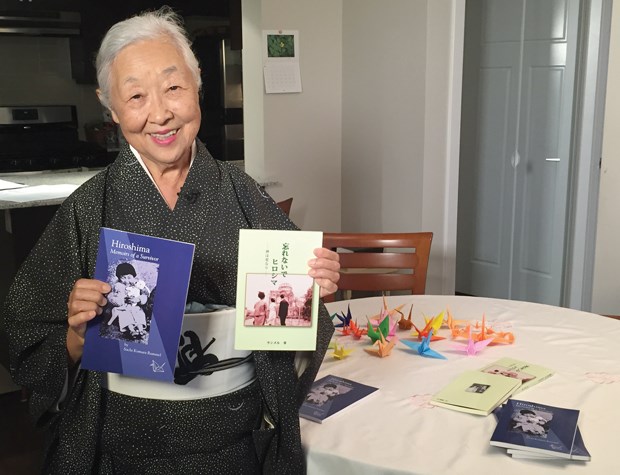WASHINGTON, AUG. 6, 1945 - An atomic bomb, hailed as the most terrible destructive force in history and as the greatest achievement of organized science, has been loosed upon Japan (excerpted from an Associated Press report).
Sachi Komura Rummel, born in Japan, citizen of Canada, resident of Squamish, belongs to a group of people whose numbers were large and are now decreasing.
Sachi is one of the hibakusha or "explosionaffected people," a survivor of the atomic bomb dropped on Hiroshima 70 years ago.
Her Atomic Bomb Survivor's Certificate is a reminder of the horror Sachi endured as a child.
A grandmother now, Sachi has written about her experience in Hiroshima, Memoirs of a Survivor. For Sachi, the book is a symbol of renewal and a message about the danger of nuclear proliferation.
"Aug. 6 is the 70th anniversary since the atomic bomb was dropped over Hiroshima, Japan.. ... 80,000 people lost their lives in an instant and Hiroshima city was demolished in an instant too.
"I was eight years old, playing in my schoolyard with my friends. Suddenly there came a flash of light followed by a tremendous blast. At that time I happened to be in the shadow of a tree. The heat was 4,000 C. By some miracle I survived," she says.
Sachi and her schoolmates survived. Her family home in the suburb of Takasu, tipped over by the force of the blast, survived.
Her family survived, all but two.
Aunt Chieko, who volunteered that day to work at a factory downtown, never returned home.
Sachi's father, Kazuo Shindo, was at work in Hiroshima. On Aug. 16, 10 days after the bomb and one day after Japan surrendered, Sachi's father died.
The cultural heritage of her country took on great significance for Sachi during the years that followed.
She was introduced to the tea ceremony, including chabana, a style of flower arrangement belonging to the ancient ritual, studying with a tea master whose family carried the tradition for 11 generations.
Steeped in Japan's culture and traditions, Sachi was also a modern young woman.
While living and working in Tokyo, she gathered with her friends at Western-style coffee houses, which offered different styles of music.
Her friendship with Charles Rummel, an exchange student from West Vancouver, began at the St. Louis coffee shop, where jazz was the preferred music, and led to marriage in 1965.
After living in Japan for 10 years, Sachi and Charles, with their two young daughters, moved to Canada, first to Toronto, then West Vancouver and to Squamish.
Sachi continued to study her culture, adding the history of the kimono to her interest in the tea ceremony and sharing these with her fellow Canadians.
Over the long years, every day of her life, the days that brought education and work, joy and laughter, husband and family, Sachi carried the legacy of Hiroshima.
"I kept silent for many years but when the nuclear power plant accident happened in Fukushima in 2011, I decided it was time to talk about my survival story.
"Many of the hibakusha are no longer with us. I am now 78 years old and luckily I am still healthy. It was very painful to evoke my past tragedy, which has been hidden in my mind as a scar. But now it is time to open my mind and speak out wishing for our peaceful future," she says.
"Science produced the atom bomb. I believe that nuclear weapons and humanity are not compatible. It is my hope our future will be peaceful and full of happiness - free of nuclear plants, free of nuclear weapons, free of nuclear wars.
"The rest of my life, I would like to tell my story, especially to young people who are casting our future as a peaceful world. So I will be a grandma storyteller."
Sachi Komura Rummel tells her story in Hiroshima, Memoirs of a Survivor. The book was published in Japanese as Wasurenaide Hiroshima in 2013.
The English language version was launched at Squamish Public Library on Aug. 6, the anniversary of Hiroshima.
Both are available from Sachi at [email protected], also at the Nikkei Centre in Burnaby and from English Bay Gallery on Granville Island.
Laura Anderson works with and for seniors on the North Shore. 778-279-2275 [email protected]



